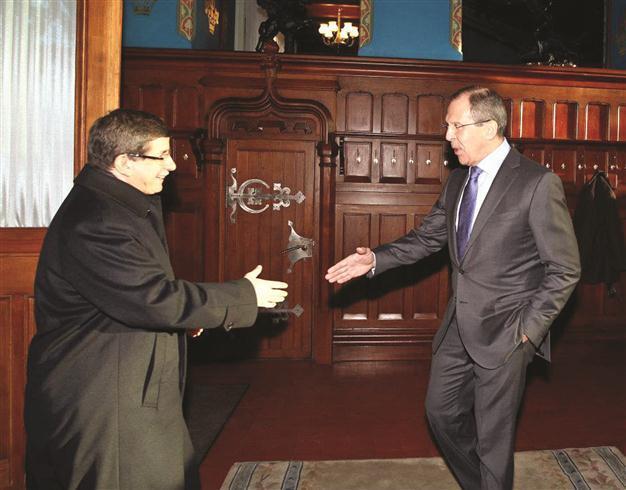Turkey, Russia converge on Syria and Iran crisis
MOSCOW / DAMASCUS

In this photo taken from Turkish Foreign Ministry’s Facebook page, Turkish FM Davutoğlu and his Russian counterpart Lavrov ready to shake hands in Moscow.
Turkish Foreign Minister Ahmet
Davutoğlu said
Turkey and Russia had a similar stance on ending the bloodshed in
Syria, adding that Turkey is ready to work with Russia on solving the crisis. Davutoğlu and his Russian counterpart Sergei
Lavrov also said the two countries have almost the same position regarding
Iran.
“An immediate halt to the bloodshed and an implementation of the reform process in Syria is important. Turkey and Russia share a similar stance on these issues,” Davutoğlu said on the close cooperation between Turkey and Russia on Syrian crisis, at a joint press conference with his Russian counterpart.
“We are always ready to work with Russia, which has an important role in the region, to solve the Syrian crisis through intense dialogue. We believe Russia could make a significant contribution on this issue,” Davutoğlu said, adding that they always back the Arab League initiative which aimed to end the regime crackdown on protesters, Anatolia news agency reported.
Lavrov echoed Davutoğlu’s words, saying Russia and Turkey have a similar stance on Syria. “Russia wants the bloodshed to end and we are in favor of a peaceful solution to the crisis through political means,” Lavrov said. On Iran he also said Russia and Turkey had almost same position and that Russia wants this issue to be solved through diplomatic means.
Lavrov revealed that they held the second meeting of the Joint Strategic Planning Group yesterday, saying Russia and Turkey were holding such meetings to converge on their positions. Davutoğlu said Turkey’s position with Russia was very similar on the Iran issue and talks on Iran’s nuclear program should resume rapidly. He said Turkey was ready to host the talks, if Iran returned to negotiation table. Lavrov confirmed that Russia was in favor of the nuclear talks being held in Turkey.
Russia open to constructive proposalLavrov stated that Russia would consider “constructive proposals” to end the bloodshed in Syria but was opposed to force or sanctions. This came one day after the U.S. State Department said U.S. and Russian diplomats held “very constructive” talks this week in Moscow, as part of an effort to resolve differences in the global response to unrest in Syria.
“We are open to constructive proposals that go in line with the set task of ending violence,” Lavrov said, Agence France-Presse reported. “Any U.N. Security Council resolution backed by Russia must firmly record that it cannot be used or interpreted to justify anyone’s outside military intervention.”
Assistant Secretary of State for Near Eastern Affairs Jeffrey Feltman reported that “he had very constructive talks in Moscow,” according State Department spokeswoman Victoria Nuland. “I wouldn’t say that there was a major breakthrough. But I think walking through how we understand the situation on the ground, how the Russians see it and then beginning to strengthen and deepen our conversation about where we go next in the U.N. Security Council, was very useful,” she said.
[HH] Bombardment in Hama
However, Nuland acknowledged disagreement over Russia’s arms sales to the Syrian government. Feltman “made clear how dangerous we consider this to be,” Nuland said. Britain, France and the United States condemned Russia’s arms sales to Syria, which they said was fueling al-
Assad’s deadly crackdown. On Jan. 23, the Russian daily newspaper Kommersant said Syria planned to buy 36 Russian Yak-130 military training aircraft, days after reports that a Russian ship was carrying 60 tons of weapons and other military equipment to Syria.
On the ground, Syria agreed to extend a widely criticized Arab League observer mission for a second month as regime troops reportedly pounded the protest hub of Hama. “The Syrian army is bombarding Hama with heavy weapons and using rocket-propelled grenades,” said a statement from the Local Coordination Committee (LCC), which organizes anti-regime protests on the ground. “The ‘shabiha’ (regime militiamen) and security agents backed up by tanks are pounding all parts of the Bab Qibli neighborhood [of Damascus],” said the LCC. “There will be dead and wounded. Houses have collapsed.”
The statement added about 4,000 soldiers, supported by tanks, were in the rebel town 210 kilometers north of Damascus.
Additional AFP stories from Washington and United Nations are used in this report.
